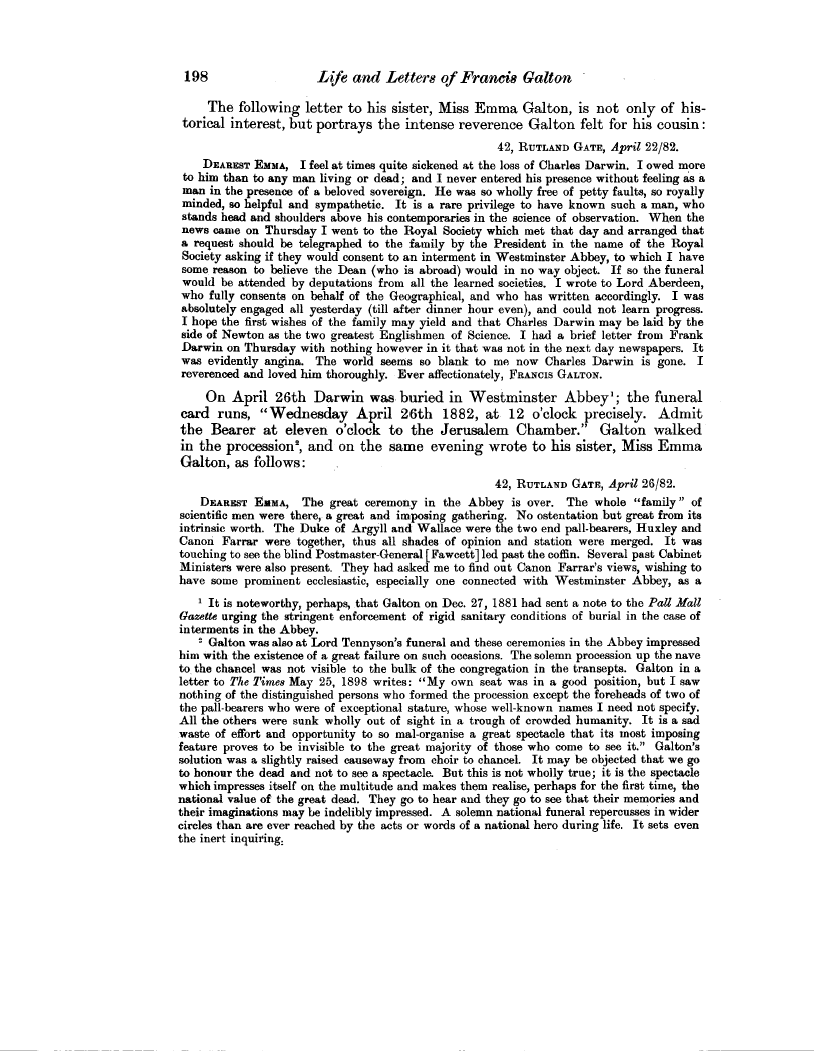198 Life and Letters of Francis Galton
The following letter to his sister, Miss Emma Galton, is not only of historical interest, but portrays the intense reverence Galton felt for his cousin
42, RUTLAND GATE, April 22/82.
DEAREST EMMA, I feel at times quite sickened at the loss of Charles Darwin. I owed more to him than to any man living or dead; and I never entered his presence without feeling as a man in the presence of a beloved sovereign. He was so wholly free of petty faults, so royally minded, so helpful and sympathetic. It is a rare privilege to have known such a man, who stands head and shoulders above his contemporaries in the science of observation. When the news came on Thursday I went to the Royal Society which met that day and arranged that a request should be telegraphed to the family by the President in the name of the Royal Society asking if they would consent to an interment in Westminster Abbey, to which I have some reason to believe the Dean (who is abroad) would in no way object. If so the funeral would be attended by deputations from all the learned societies. I wrote to Lord Aberdeen, who fully consents on behalf of the Geographical, and who has written accordingly. I was absolutely engaged all yesterday (till after dinner hour even), and could not learn progress. I hope the first wishes of the family may yield and that Charles Darwin may be laid by the side of Newton as the two greatest Englishmen of Science. I had a brief letter from Frank Darwin on Thursday with nothing however in it that was not in the next day newspapers. It was evidently angina. The world seems so blank to me now Charles Darwin is gone. I reverenced and loved him thoroughly. Ever affectionately, FRANCIS GALTON.
On April 26th Darwin was buried in Westminster Abbey'; the funeral card runs, "Wednesday April 26th 1882, at 12 o'clock precisely. Admit the Bearer at eleven o'clock to the Jerusalem Chamber." Galton walked in the processions, and on the same evening wrote to his sister, Miss Emma Galton, as follows
42, RUTLAND GATE, April 26/82.
DEAREST EMMA, The great ceremony in the Abbey is over. The whole "family" of scientific men were there, a great and imposing gathering. No ostentation but great from its intrinsic worth. The Duke of Argyll and Wallace were the two end pall-bearers, Huxley and Canon Farrar were together, thus all shades of opinion and station were merged. It was touching to see the blind Postmaster-General [Fawcett] led past the coffin. Several past Cabinet Ministers were also present. They had asked me to find out Canon Farrar's views, wishing to have some prominent ecclesiastic, especially one connected with Westminster Abbey, as a
1 It is noteworthy, perhaps, that Galton on Dec. 27, 1881 had sent a note to the Pall Mall Gazette urging the stringent enforcement of rigid sanitary conditions of burial in the case of interments in the Abbey.
Galton was also at Lord Tennyson's funeral and these ceremonies in the Abbey impressed him with the existence of a great failure on such occasions. The solemn procession up the nave to, the chancel was not visible to the bulk of the congregation in the transepts. Galton in a letter to The Times May 25, 1898 writes: "My own seat was in a good position, but I saw nothing of the distinguished persons who formed the procession except the foreheads of two of the pall-bearers who were of exceptional stature, whose well-known names I need not specify. All the others were sunk wholly out of sight in a trough of crowded humanity. It is a sad waste of effort and opportunity to so mal-organise a great spectacle that its most imposing feature proves to be invisible to the great majority of those who come to see it." Galton's solution was a slightly raised causeway from choir to chancel. It may be objected that we go to honour the dead and not to see a spectacle. But this is not wholly true; it is the spectacle which impresses itself on the multitude and makes them realise, perhaps for the first time, the national value of the great dead. They go to hear and they go to see that their memories and their imaginations may be indelibly impressed. A solemn national funeral repercusses in wider circles than are ever reached by the acts or words of a national hero during life. It sets even the inert inquiring.

